OCD and Depression Medication Comparison Tool
Personalized Medication Selection
Answer a few questions to see which medications might be best for your specific situation. This tool compares Clofranil (clomipramine) with alternatives based on your needs and concerns.
Select your concerns and side effect priorities to see personalized recommendations.
Clomipramine, sold under the brand name Clofranil, has been used for decades to treat obsessive-compulsive disorder (OCD) and severe depression. It’s one of the few antidepressants specifically approved for OCD in the UK and US. But it’s not the only option-and for many people, it’s not the best fit. Side effects like dry mouth, drowsiness, weight gain, and heart rhythm changes can make it hard to stick with. So, what are the real alternatives? And how do they stack up when you’re trying to find relief without the toll?
How Clofranil Works and Why It’s Different
Clofranil is a tricyclic antidepressant (TCA), which means it affects multiple brain chemicals at once-mainly serotonin and norepinephrine. Unlike newer SSRIs that target serotonin only, clomipramine hits both. This broader action is why it works well for OCD, where serotonin imbalance plays a strong role. Studies show it reduces OCD symptoms in about 60-70% of people who take it long-term.
But that same broad action is also why side effects are more common. Clomipramine blocks histamine, acetylcholine, and alpha-adrenergic receptors too. That’s what causes the dry mouth, blurred vision, constipation, and dizziness. It can also raise your heart rate or affect your ECG, which is why doctors check your heart before and during treatment.
SSRIs: The First-Line Alternatives
For most people today, SSRIs are the go-to first choice for OCD and depression. These include sertraline (Zoloft), fluoxetine (Prozac), fluvoxamine (Luvox), and escitalopram (Lexapro). Unlike Clofranil, they’re much more selective-mostly just boosting serotonin. That means fewer side effects.
Head-to-head trials show SSRIs are nearly as effective as clomipramine for OCD, but with a better safety profile. For example, a 2023 meta-analysis in The British Journal of Psychiatry found fluvoxamine and sertraline had similar response rates to clomipramine, but 40% fewer people dropped out due to side effects.
Fluvoxamine is actually the only SSRI approved specifically for OCD in the UK, though sertraline and fluoxetine are commonly prescribed off-label. They’re also safer in overdose, which matters if someone’s struggling with suicidal thoughts.
SNRIs: A Middle Ground
If SSRIs don’t work well enough, venlafaxine (Effexor) and duloxetine (Cymbalta) are next. These are serotonin-norepinephrine reuptake inhibitors (SNRIs). They’re closer to clomipramine in how they work, but without the heavy anticholinergic side effects.
Studies suggest venlafaxine can help with OCD when SSRIs fail, especially in cases with strong anxiety or low energy. But it’s not as strong as clomipramine for pure OCD symptoms. Duloxetine is mainly used for depression with physical pain, not OCD. So it’s not usually an OCD alternative, but it can be useful if someone has both depression and chronic pain.
Atypical Antidepressants: Bupropion and Mirtazapine
Bupropion (Wellbutrin) works differently-it boosts dopamine and norepinephrine, not serotonin. That makes it a poor choice for OCD, since serotonin is the key player. But it’s great for depression with fatigue or low motivation, and it doesn’t cause weight gain or sexual side effects. If someone’s on Clofranil and struggling with those issues, switching to bupropion might help their mood-but not their OCD.
Mirtazapine (Remeron) is another option for depression, especially if sleep problems are a big issue. It can make you drowsy, which some people like, but it also causes weight gain and increased appetite. It doesn’t help OCD symptoms, so it’s not a direct alternative for that condition.
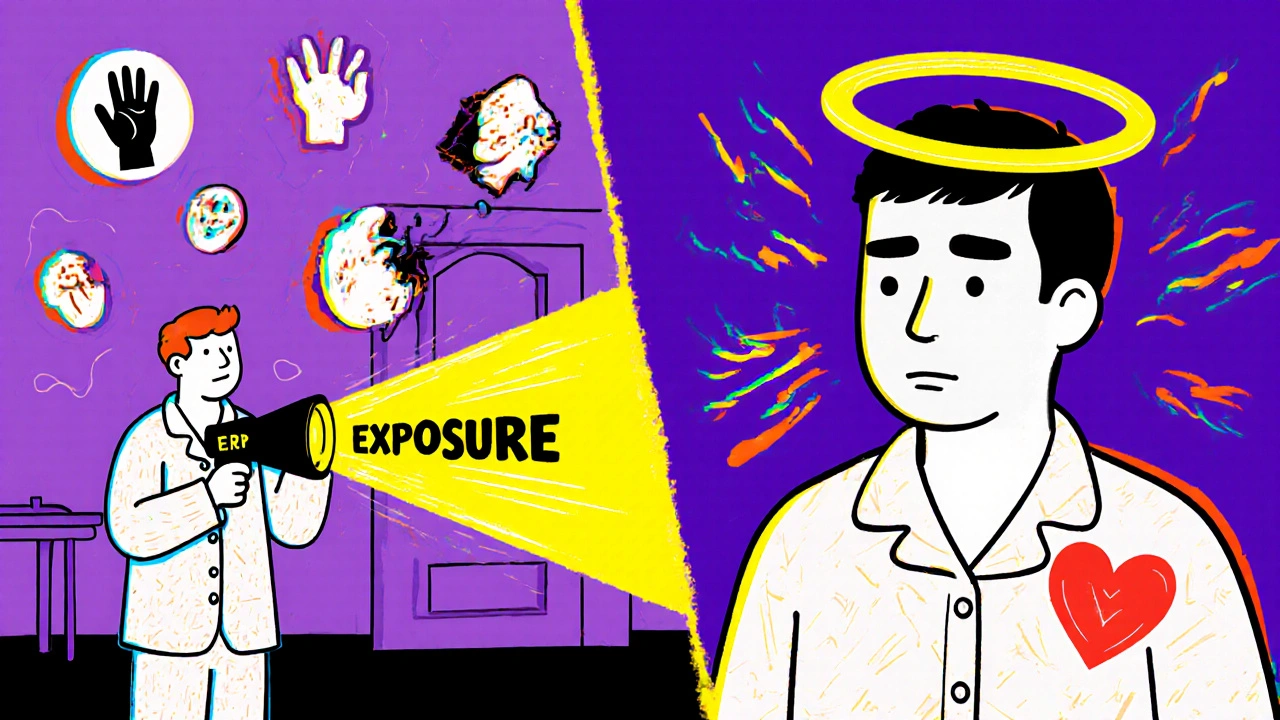
Other Options: Clonazepam, CBT, and Beyond
Some people try benzodiazepines like clonazepam for OCD because they reduce anxiety fast. But they don’t fix the core obsessions or compulsions. They’re only for short-term relief, and they carry risks of dependence. Not a long-term solution.
That’s where therapy comes in. Cognitive behavioural therapy (CBT), especially exposure and response prevention (ERP), is the most effective non-drug treatment for OCD. In fact, research shows ERP works as well as medication for many people-and the benefits last longer after stopping. Many clinicians now recommend combining ERP with an SSRI for the best results.
For treatment-resistant OCD, doctors might look at antipsychotics like risperidone or aripiprazole as add-ons to SSRIs. Or, in rare cases, ketamine infusions or deep brain stimulation. These are last-resort options, not alternatives to Clofranil for most people.
Side-by-Side Comparison: Clofranil vs. Top Alternatives
| Medication | Type | Effective for OCD? | Common Side Effects | Heart Risk | Weight Gain | Sexual Side Effects |
|---|---|---|---|---|---|---|
| Clofranil (Clomipramine) | Tricyclic Antidepressant | Yes - gold standard | Dry mouth, drowsiness, constipation, blurred vision | High - can prolong QT interval | High | High |
| Sertraline (Zoloft) | SSRI | Yes - first-line | Nausea, insomnia, mild agitation | Low | Mild to moderate | High |
| Fluoxetine (Prozac) | SSRI | Yes - long-lasting | Nausea, nervousness, headache | Low | Mild | High |
| Venlafaxine (Effexor) | SNRI | Moderate - used if SSRIs fail | Nausea, increased blood pressure, sweating | Moderate | Mild | High |
| Bupropion (Wellbutrin) | Atypical | No - not effective for OCD | Insomnia, dry mouth, tremor | Low | None or loss | Low |
When to Stick With Clofranil
Clomipramine isn’t outdated-it’s just not for everyone. If you’ve tried two or three SSRIs and they didn’t help enough, Clofranil might be the next step. It’s still the most effective single drug for severe OCD, especially when compulsions are intense or rituals are time-consuming.
It’s also used when depression is deeply tied to OCD symptoms, and other antidepressants haven’t touched the mood part. Some people find that even with side effects, the relief is worth it. That’s a personal trade-off, not a medical one.
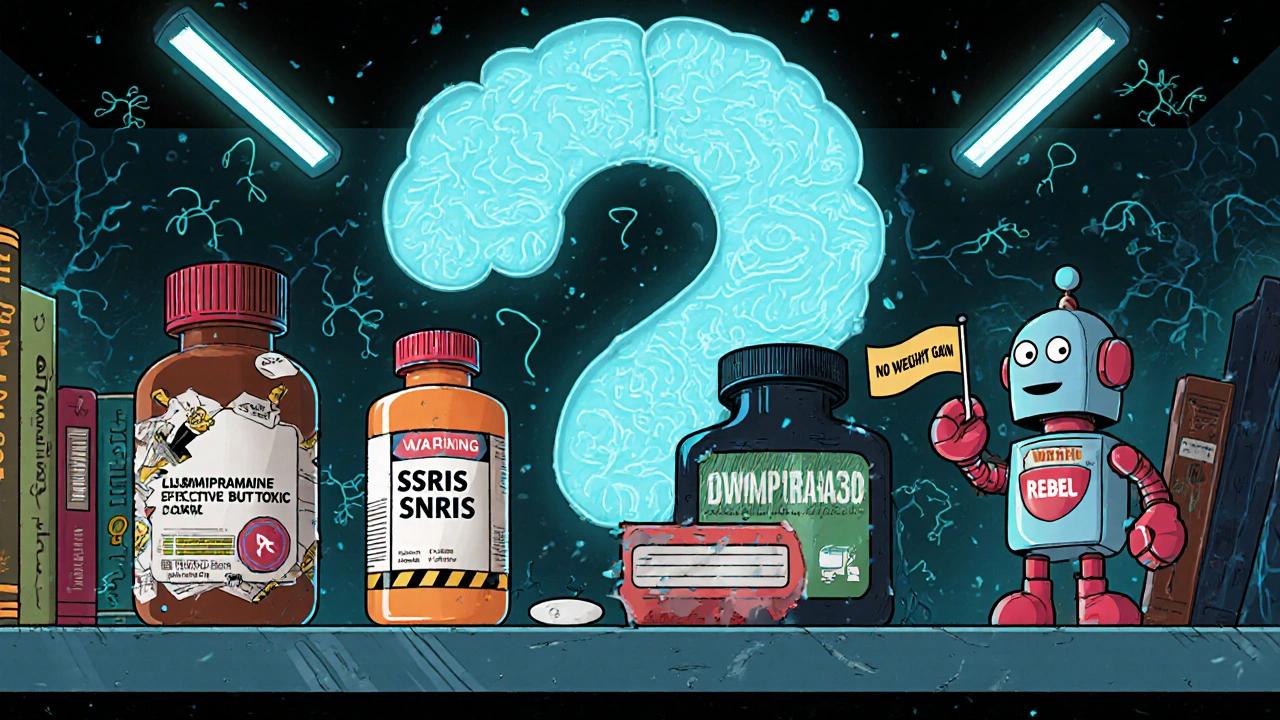
What to Do If Clofranil Isn’t Working
If you’re on Clofranil and not improving after 8-12 weeks at a full dose (75-250 mg/day), talk to your doctor. Don’t just stop. Tapering off too fast can cause withdrawal-dizziness, nausea, mood swings.
Options include:
- Switching to an SSRI like sertraline or fluvoxamine
- Adding ERP therapy to your current treatment
- Trying an SSRI + low-dose antipsychotic (like risperidone)
- Combining clomipramine with CBT if you haven’t tried it yet
Many people feel better with a combination. Medication helps calm the brain’s alarm system; therapy teaches you how to respond differently to intrusive thoughts.
Final Thoughts: It’s Not About the Drug-It’s About You
There’s no single best medication for OCD or depression. What works for one person might not work for another. Clofranil has a strong track record, but so do SSRIs. The real question isn’t which drug is stronger-it’s which one lets you live your life with fewer side effects and more control.
If you’re struggling with side effects, ask about switching. If you’re not improving, ask about therapy. And if you’re scared to change, talk to someone who’s been there. You’re not alone-and there are more options than you think.
Is Clofranil stronger than SSRIs for OCD?
Yes, in direct comparisons, Clofranil tends to be slightly more effective for severe OCD symptoms than SSRIs. But the difference isn’t huge-about 10-15% better in clinical trials. The trade-off is more side effects. For many people, SSRIs are preferred because they’re safer and better tolerated, even if they’re a bit less potent.
Can I switch from Clofranil to an SSRI safely?
Yes, but it must be done slowly under medical supervision. Because Clofranil stays in your system longer than most SSRIs, you usually need to taper it down over several weeks before starting the new drug. A direct switch can cause serotonin syndrome, especially if you start the SSRI too soon. Your doctor will create a plan based on your dose and how long you’ve been on Clofranil.
Do clomipramine alternatives cause weight gain?
Clofranil is one of the worst offenders for weight gain among antidepressants. Most SSRIs cause mild to moderate weight gain over time, but bupropion can actually help with weight loss. Mirtazapine causes significant weight gain, so it’s not ideal if that’s a concern. Venlafaxine has a lower risk than Clofranil but higher than SSRIs.
Why isn’t Clofranil used as a first choice anymore?
Because SSRIs are safer, easier to tolerate, and almost as effective. Clofranil can affect heart rhythm, especially in older adults or people with existing heart conditions. It also has a higher risk of overdose toxicity. Since SSRIs came on the market in the 1990s, guidelines have shifted to recommend them first-unless OCD is very severe or hasn’t responded to other treatments.
Can I use therapy instead of medication for OCD?
Yes, especially exposure and response prevention (ERP) therapy. Multiple studies show ERP is as effective as medication for many people with OCD. In fact, combining ERP with an SSRI gives the best long-term results. Some people choose therapy alone, especially if they want to avoid side effects or are pregnant. It takes effort and time-but it works.
Next Steps: What to Ask Your Doctor
If you’re on Clofranil and wondering if there’s a better option, here’s what to bring up:
- "I’m having trouble with [side effect]. Are there alternatives with fewer of these?"
- "I’ve been on this for [X months] and still feel [symptom]. Should we try something else?"
- "Have you considered adding ERP therapy to my treatment?"
- "Is my heart health being monitored regularly on this medication?"
- "What’s the plan if this doesn’t work in the next few months?"
You don’t have to stay on a medication that makes you feel worse. There are options. The goal isn’t just to reduce symptoms-it’s to help you live better.
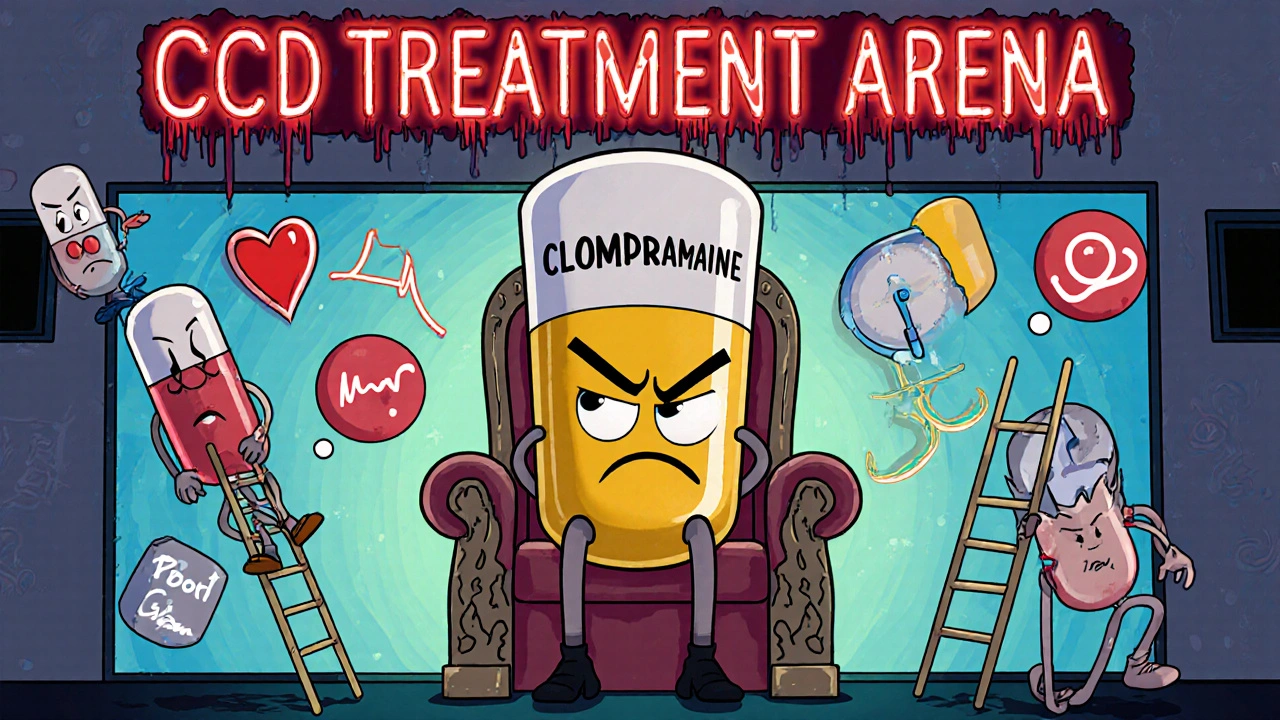
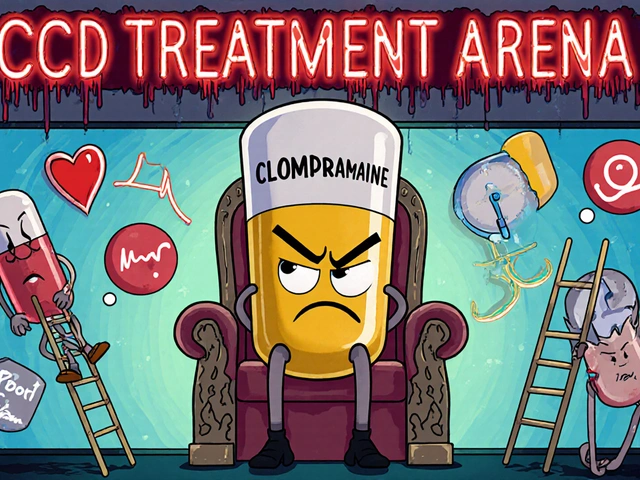



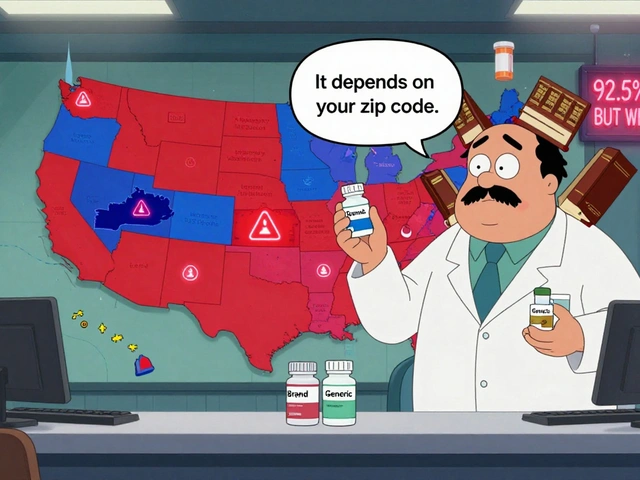

Janet Carnell Lorenz
October 31, 2025 AT 06:32Man, I switched from Clofranil to sertraline last year after my heart started acting up. Didn’t think I’d feel better, but honestly? My anxiety dropped, I stopped feeling like a zombie at work, and I even lost a few pounds. Side effects? Sure, nausea for the first week, but nothing like the dry mouth that made me feel like I was chewing sand. If you’re on Clofranil and it’s dragging you down, don’t be afraid to ask for a switch. Your body deserves a break.
Sarah CaniCore
November 1, 2025 AT 12:51Of course clomipramine works-it’s basically antidepressant brute force. But people act like SSRIs are weak sauce. Newsflash: if your OCD is so bad you need a drug that nearly kills you to manage it, maybe therapy should’ve been your first stop instead of popping pills like candy.
RaeLynn Sawyer
November 2, 2025 AT 06:36Stop prescribing drugs like they’re candy.
Rob Giuffria
November 3, 2025 AT 12:11Oh, so now we’re back to the ‘therapy is better’ mantra? Let me guess-you’ve never had a compulsion that made you scream into a pillow at 3 a.m. because you had to touch the doorknob exactly seven times. ERP doesn’t fix your brain chemistry. It just tells you to suffer differently. Clomipramine might wreck your mouth and your heart, but at least it shuts the noise down. No amount of breathing exercises fixes a serotonin tsunami.
Barnabas Lautenschlage
November 4, 2025 AT 03:14There’s a lot of nuance here that gets lost in the noise. Clomipramine’s efficacy for severe, treatment-resistant OCD is well-documented-it’s not obsolete, it’s just high-risk. SSRIs aren’t ‘weaker,’ they’re just safer for the majority. The real issue isn’t which drug wins, but whether the treatment plan includes monitoring, titration, and psychological support. Too often, people get prescribed a med and left to fend for themselves. That’s not care, that’s chemical triage. A holistic approach-medication + ERP + regular cardiac checks-is what actually improves long-term outcomes. The table in the post is excellent, but it’s only half the story.
Patricia Roberts
November 4, 2025 AT 18:51So let me get this straight: the gold standard for OCD is a drug that makes you feel like you’ve been hit by a truck… but we’re supposed to feel bad for not using it? Next you’ll tell me penicillin is outdated because aspirin doesn’t kill your gut. We live in the age of precision medicine, not ‘take this and hope you don’t die.’
Jay Williams
November 5, 2025 AT 09:28As someone who’s been on clomipramine for over a decade and has watched three friends struggle through the side effects trying to get to the same place, I want to say this: it’s not about which drug is stronger-it’s about which drug lets you live. I’ve been on 200mg daily for eight years. I have dry mouth, I gain weight, I need ECGs every six months. But I can go to work, hug my kids, and not feel like my brain is on fire. I’m not proud of the side effects, but I’m proud of the life I’ve built despite them. That said-I wish I’d done ERP years ago. I wish I’d known that medication isn’t the finish line, it’s just the starting line. If you’re reading this and you’re stuck on Clofranil and it’s not working? Talk to your doctor. If you’re on an SSRI and it’s not enough? Don’t give up. Add ERP. Try a different dose. Try a different SSRI. You’re not broken-you’re just still searching. And that’s okay.
Adrian Clark
November 6, 2025 AT 08:06Oh wow, a 2000-word essay on antidepressants. Did someone pay you to write this? Or are you just trying to convince yourself you’re not a junkie? Let’s be real-nobody cares about QT intervals and meta-analyses. What matters is: does it make the screaming in your head stop? If yes, take it. If no, try something else. If you’re still reading this comment after paragraph three… you probably need a therapist, not a drug comparison chart.